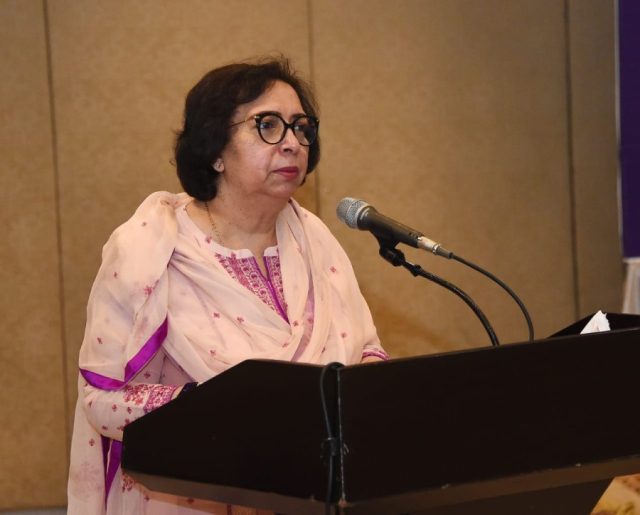KATHMANDU, Monday, August 18, 2025 (WNP): Chairperson of Pakistan’s National Assembly Standing Committee on Climate Change, Munaza Hassan, on Monday urged Hindu Kush Himalaya (HKH) nations to forge a “regional pact of climate solidarity” — to legislate together, innovate together, and speak with one voice in global negotiations.
“The world must know—the mountains that unite us are not only our shared heritage, they are our shared line of defence, and history will not forgive hesitation,” she said while addressing the Hindu Kush Himalaya Parliamentarians’ Meet 2025 in Kathmandu.
The two-day high-level gathering has brought together around 70 parliamentarians — mainly chairs, co-chairs and members of parliamentary climate committees — along with experts from across the HKH region to strengthen cooperation on pressing environmental challenges.
Munaza Hassan said the Hindu Kush Himalaya, which feeds rivers, shapes climates, and sustains nearly two billion lives, is under existential threat. “These mountains are bleeding ice. This is not the slow march of nature—it is an existential war being fought in real time, against forces unleashed by human hands,” she declared.
Highlighting her country’s vulnerability, Hassan recalled the devastating floods of 2022 that submerged one-third of Pakistan, displacing 33 million people. She pointed to the deadly heatwaves of 2024 and the recurring glacial lake outburst floods (GLOFs) in Gilgit-Baltistan and Chitral, which continue to destroy villages and vital infrastructure.
“In 2025 alone, fresh GLOFs and monsoon floods have killed over 300 people and displaced thousands, while drought cripples agriculture in Sindh and Balochistan, and smog suffocates our cities,” she said.
“Pakistan has learned a brutal truth: climate change is no longer a challenge of tomorrow—it is the disaster of today.”
Despite the devastation, Hassan stressed Pakistan’s determination to fight back through law, policy, and innovation. She cited constitutional amendments enshrining climate as a fundamental right, the introduction of a Carbon Levy on polluting industries in 2025, and the launch of the National EV Policy 2025–2030.
She also underscored Pakistan’s clean energy revolution, noting that solar power now provides more than one-quarter of the country’s electricity, placing Pakistan among the world’s “25% solar club.” With 17 gigawatts added in 2024 alone, Pakistan has nearly doubled renewable capacity in three years, supported by grassroots solar adoption that has surpassed 5.3 GW in net-metered capacity by April 2025.
On conservation, she highlighted the 10 Billion Tree initiative, expansion of protected areas, and Pakistan’s pivotal role in establishing the Global Loss and Damage Fund, financing climate resilience at the community level.
But Hassan warned that no nation can win this fight alone. “The Hindu Kush Himalaya is a single ecosystem—our rivers do not stop at borders, our glaciers do not ask for visas, and our air does not recognize sovereignty. We rise or fall together,” she said.
She stressed that the Parliamentarians’ Meet was “more than dialogue—it is the call to arms of our generation,” urging regional lawmakers to act decisively to protect communities from Bhutan to Bangladesh and from Afghanistan to Myanmar.
“Pakistan comes to Kathmandu with determination: to share lessons, to learn, and to lead where leadership is required. Let us prove that together, we can sustain nature, and by doing so, empower our people,” she concluded.




